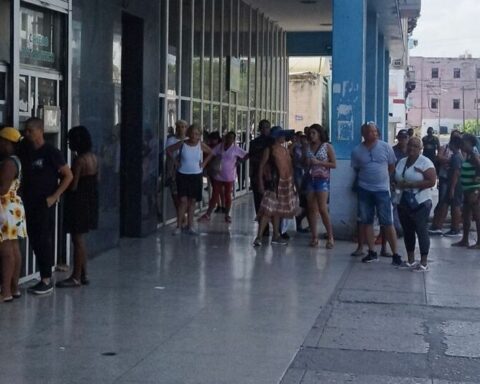For the second consecutive day, residents of various neighborhoods in Havana took to the streets. Thus, on La Palma and in Bejucal Causewayin the municipality of Arroyo Naranjo, or in big bridgesBeach, where they have not had electricity for 72 hours.
various videos circulating on social media they show a crowd in Arroyo Naranjo with pots and pans and shouting for the government to resolve the energy crisis facing the country. “They blocked the street so they don’t pass,” says a woman who records the protest. “Down with the dictatorship, enough already!” she shouts, as she joins the protesters. Along with the crowd there are several policemen without daring to intervene.
The passage of Hurricane Ian, the collapse of the National Electric System and the growing shortage of supplies have thrown Cubans into a new wave of demonstrations. During the afternoon-night of this Thursday, the residents of several municipalities of Havana demonstrated, including Hill, San Miguel del Padrón and Arroyo Naranjo.
Those who have been able to charge their mobiles and record the protests try not to focus directly on the faces of the people, since the Police later use these recordings to identify and arrest them, as it already happened on 11J.
Regarding the interruption of the internet after the protests, starting at 8:00 p.m. this Thursday, this newspaper asked Etecsa for explanations. The operator’s response was that the service “is interrupted at the national level”, and that work is being done to solve the “difficulty”. Regarding the causes of the interruption, he answered emphatically that “he could not give that information.”
#CubaProtestsBlackout The Cubans, tired of so many miseries and crises, confront the leaders and officials. More information in https://t.co/i96XEerLyS pic.twitter.com/FZYCvbOS2M
— 14ymedio (@14ymedio) September 30, 2022
This Thursday, some officials of the Provincial Defense Council (CDP) tried to placate the crowd with the usual rhetoric of the Government. One of these episodes took place in a Havana neighborhood, where a woman interrupted a leader, dressed as a soldier: “I don’t believe in you”. Next to her, an older woman snapped at the uniformed woman: “I am materialistic, I am not idealistic, I believe in what I see; if in 72 hours they have not done anything, I have to say that nothing is done.” The words were welcomed with applause by those present.
Another official, who was trying to “explain the situation”, he was also rebuked by those present: “Why don’t they take the fuel from the patrols and use it for the electric company’s cars?”
The president of the CDP himself, Luis Antonio Torres Iríbar, recognized this Friday that during the night “we had to face isolated situations in the province, where there were popular complaints about the water situation, about the electricity situation, about the loss of food due to lack of electricity,” and conceded: “Those complaints We consider them fair.”
“I believe that protesting is a right, but it is a right when those responsible for the State and the Government are failing to do what is their responsibility,” he claimed The official, and then, justified: “But in the conditions we are talking about, yesterday’s protests, instead of helping, slow down the fulfillment of that mission and that desire that we have in the shortest time possible to have the recovery total”.
Three days after the impact of the cyclone, the lack of electricity mainly affects the little food stored in the refrigerators. Some managed to freeze some bottles of water to keep the temperature low inside the device, but the ice has already melted and the food is threatening to spoil.
This has led to the pressing need to consume the reserves of meat, milk and other products. Even if electricity is restored in the next few hours, getting food will be the toughest challenge for the population in a country that, before the hurricane, already had an alarming shortage.
“I believe that protesting is a right, but it is a right when those responsible for the State and the Government are failing to do what they are responsible for”
Meanwhile, the Government has mobilized its police and military forces, which has left several points that the authorities consider key “unprotected”, such as the warehouses. In these establishments, as well as in warehouses or other food warehouses, the Police have placed inconspicuous “collaborators”, often young men of military age, to stand guard.
According to the official newspaper Tribune of Havana, the Ministry of Internal Trade notified that more than 700 “economic objectives” were damaged by the hurricane Ian in the west of the Island, which includes wineries, restaurants, warehouses and construction material stores. Landslides, fallen roofs and the disabling of structures are some of the most serious damages, along with the loss of products.
The Government has assured that it prioritizes “maintaining offers of prepared food for the evacuated population”, which are limited in the “cooking of food”. He forgets, however, that the rest of the country faces those same limitations to preserve and cook products without electricity.
________________________
Collaborate with our work:
The team of 14ymedio is committed to doing serious journalism that reflects the reality of deep Cuba. Thank you for joining us on this long road. We invite you to continue supporting us, but this time becoming a member of our journal. Together we can continue transforming journalism in Cuba.








